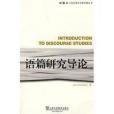《語篇研究導論》是2009年出版的圖書,作者是雷可瑪。
基本介紹
- 中文名:語篇研究導論
- 作者:[荷]雷可瑪
- 出版時間:2009年7月
- 出版社:上海外語教育出版社
- 頁數:363 頁
- ISBN:9787544613583
- 定價:55 元
內容介紹,作品目錄,
內容介紹
《語篇研究導論》通過實例分析,深入淺出地、系統地介紹了語篇研究理論,為讀者從事文學研究打下了基礎。為方便讀者使用,《語篇研究導論》收錄了語篇研究領坷中使用頻繁的概念,設定了富有啟發性的思考題,並配有答案。《語篇研究導論》作者是語篇研究領域卓有建樹的學者,也以四種語言出版的Discoursd Studies Anntroductory Textbook(1993)在學界受到廣泛歡迎。
作品目錄
Acknowledgments
1 Introduction
1.1 A rough definition of discourse studies
1.2 Aim and structure of this book
1.3 The presentation of the material
Questions and assignments
Bibliographical information
PART Ⅰ
General orientation
2 Communication as action
2.1 The Organon model
2.2 Speech act theory
2.3 Illocutions in discourse
2.4 The cooperative principle
2.5 Relevance theory
2.6 Politeness theory
Questions and assignments
Bibliographical information
3 Discourse in communication
3.1 The pragmatic perspective
3.2 Rules for symbolic interaction
3.3 Messages between sender and receiver
3.4 The discourse situation
3.5 The socio-semiotic approach
3.6 What makes discourse discourse?
Questions and assignments
Bibliographical information
PART Ⅱ
Backpacking for a scientific journey
4 Discourse types
4.1 The variety of functions and forms
4.2 Written language and verbal interaction
4,3 Everyday and literary language
4.4 Electronic discourse
4.5 Conventionalized forms for conventionalized occadions
4,6 Multimodality
Questions and assignments
Bibliographical information
5 Structured content
5.1 Propositions
5.2 Topics
5.3 Macrostructures
5.4 Superstructures
Questions and assignments
Bibliographical information
6 Discourse connections
6.1 Cohesion
6.2 Referential elements
6.3 Coherence
6.4 Rhetorical Structure Theory
6.5 Discourse relation research
Questions and assignments
Bibliographical information
7 Contextual phenomena
7.1 Deixis
7.2 Staging
7.3 Perspectivization
7.4 Given-new management
7.5 Presuppositions
7.6 Inferences
Questions and assignments
Bibliographical information
8 Style
8.1 Form, content and situation
8.2 Views on style
8.3 Stylistic analysis
8.4 Examples of stylistic research
Questions and assignments
Bibliographical information
PART Ⅲ
Special modes of communication
9 Conversation analysis
9.1 Transcription systems
9.2 The turn-taking model
9.3 Sequential organization
9.4 Discourse markers
Questions and assignments
Bibliographical information
10 Informative discourse
10.1 Readability in a formula
lO.2 The measurement of understanding
10.3 Judging discourse quality
lO.4 The improvement of documents
Questions and assignments
Bibliographical information
11 Narratives
11.1 The structure of fairy tales
11.2 The sociolinguistic approach
11.3 The psycholinguistic approach
11.4 The organizational approach
Questions and assignments
Bibliographical information
12 Argumentation and persuasion
12.1 The structure of argumentation
12.2 The pragma-dialectical approach
12.3 The social-psychological approach
12.4 The quality of argumentation
Questions and assignments
Bibliographical information
PART IV
Special interests
13 Discourse and cognition
13.1 Modeling discourse production
13.2 Product and process analysis
13.3 Processing and prior knowledge
13.4 Aspects of processing
13.5 Modeling discourse processing
13.6 The metaphor in cognitive research
Questions and assignments
Bibliographical information
14 Discourse and institution
14.1 The agent-client approach
14.2 Politics
14.3 Law
i4.4 Bureaucracy
14.5 Media
14.6 Health care
Questions and assignments
Bibliographical information
15 Discourse and culture
15.1 The Sapir-Whorfhypothesis
15.2 Critical Discourse Analysis
15.3 Gender
15.4 Racism
15.5 Intercultural communication
Questions and assignments
Bibliographical information
Key to the questions
References
Index

